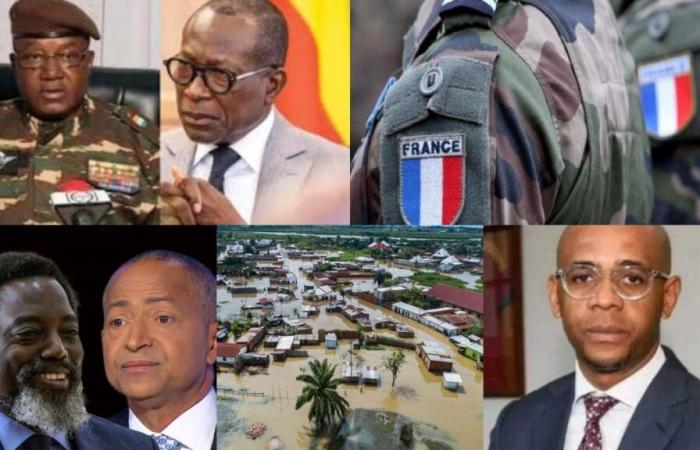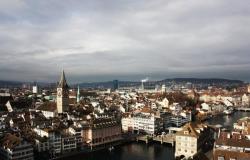2024 has just given way to a new year, 2025. During the year which has just ended, the political and social news of the African continent was full of events, some of which Afrik.com has selected among the most striking in this second article.
Among the most notable events in 2024 in Africa, there is the loss of hegemony of the ANC in South Africa, tensions between Benin and Niger, floods, the end of the military presence in Senegal and Chad, the Baltasar affair and the alliance between Kabila and Katumbi to say no to the draft revision of the Constitution supported by President Thisekedi.
The ANC loses for the first time and forms a government of national unity
2024 was marked by a political earthquake in South Africa. Indeed, for the first time since the end of Apartheid, the ANC lost its absolute majority in Parliament and was forced to form a government of national unity with a party like the Democratic Alliance (DA), which was fundamentally opposed to its governance. With 40% of the seats in Parliament, Nelson Mandela’s party did not have the absolute majority to continue to govern alone.
Cyril Rampahosa was certainly re-elected, but is now forced to cooperate with the Democratic Alliance. This is the direct consequence of corruption which had become an endemic evil in the country, especially under the mandate of Jacob Zuma who was finally forced to resign in 2018. The impact of this great corruption continues to be felt in the daily lives of people. South Africans who began to lose faith in this party which had led the fight against the Apartheid regime.
Benin-Niger tensions
In West Africa, the tension between Benin and Niger, extension of the tension between ECOWAS since the coup d’état of July 26, 2023. In May, President Patrice Talon decided to block the shipment of oil Nigerien in Benin to protest against the choice of the Nigerien authorities to keep their country’s borders closed. Then begins a real standoff between the two neighboring countries, punctuated by accusations from Niger, denied by Benin.
It took the visit of former Beninese Presidents, Nicéphore Soglo and Boni Yayi to Niger for a thaw to be observed. Indeed, a few weeks after the good offices mission of former Beninese Presidents to the authorities of Niger, a high-level Nigerien delegation led by General Mohamed Toumba, Minister of the Interior, was received in Cotonou by President Patrice Talon. Soon after, ambassadors were appointed from both sides. Despite this progress, the Nigerien border remained closed. Before the rebound that occurred a few days ago with the resumption of accusations against Benin by Niger.
A year of floods in Africa
2024 will also have been a remarkable year due to the floods which affected several countries on the continent. From Morocco to Nigeria, via Mali, Niger, Chad, South Sudan, the waters, in their fury, have dictated their law to all these countries, taking lives and destroying crops and homes. In September, Chad recorded no less than 250 deaths and 1.5 million victims. In neighboring Niger, there are at least 273 dead and 700,000 victims. In Mali, a state of national disaster was declared when the country counted 18,140 affected households and 42 deaths at the beginning of September. The country was forced to seek international assistance in the face of the damage caused by the waters.
End of the French military presence in Senegal and Chad
At the end of November, the new Senegalese President, Bassirou Diomaye Faye, announced during an interview with French media the end of the French military presence in Senegal. A decision that came suddenly, but which should not surprise anyone following Senegalese political news. Since President Faye’s announcement only confirms a PASTEF campaign promise. With this Senegalese decision, France loses a significant ally in West Africa. However, Bassirou Diomaye Faye clarified that France remains a “privileged partner” for his country. In any case, a new era is opening in Franco-Senegalese military relations, with the Senegalese side loudly claiming its sovereignty.
At the same time, the Chad of Mahamat Idriss Déby Itno broke the military agreements linking it to France, and demanded a rapid departure of French soldiers from its territory. Despite the surprising nature of the Chadian decision, France quickly began its withdrawal by handing over, on December 26, a first military base – the Faya base in the far desert north of the country – to Chad.
Following its setbacks in the AES countries, France had already decided to reconfigure its military presence in Africa. In this sense, the French military base will be returned to Côte d’Ivoire from January 2025. The announcement was made Tuesday evening by President Alassane Ouattara during his end-of-year speech. “Thus, the camp of the 43rd BIMA, the Port-Bouët marine infantry battalion, will be handed over to the armed forces of Côte d’Ivoire from this month of January 2025,” declared the Ivorian head of state.
Baltasar affair and its 400 blows
Named after the Equatorial Guinean Baltasar Ebang Engonga, the Baltasar affair is a sex scandal that shook Equatorial Guinea and well beyond for several weeks. The main protagonist in the affair is the son of Baltasar Engonga Edjo’o, president of the CEMAC Commission and close to President Teodoro Obiang Nguema Mbasogo. A senior official in his country’s administration, Baltasar Ebang Engonga headed the National Financial Investigation Agency. And it was in his office that he recorded a good part of his sexual encounters with dozens of women, including the wives and daughters of dignitaries of the Malabo regime.
More than 400 videos of these intimate relationships were leaked on social networks, causing a scandal that crossed the borders of Equatorial Guinea. One more scandal for a regime that is multiplying them. The escapades and ostentatious lifestyle of the country’s Vice President himself, including purchases of luxurious properties and extravagant spending in Europe and the United States, are an open secret.
Union of the two “Ks” against Tshisekedi
African political news has become accustomed to all kinds of alliances between political actors depending on the interests of the moment. And the year 2024 confirmed this rule in the DRC between two old friends who had by force become political adversaries. Joseph Kabila and Moïse Katumbi, once very close, became fierce political adversaries because the first, in power, wanted to modify the Constitution, and the second was fiercely opposed to it. The two men met in Addis Ababa to seal their anti-revision of the Constitution alliance, in a word, to wage the same fight. This time, the one in power and who wants to revise the Constitution is Félix Tshisekedi. He who, alongside Katumbi, led, just a few years ago, the fight against this same revision of the Constitution initiated by Joseph Kabila.






